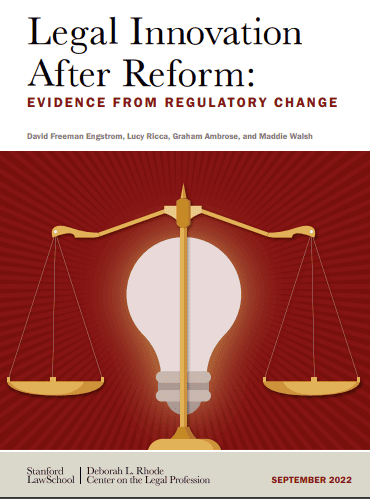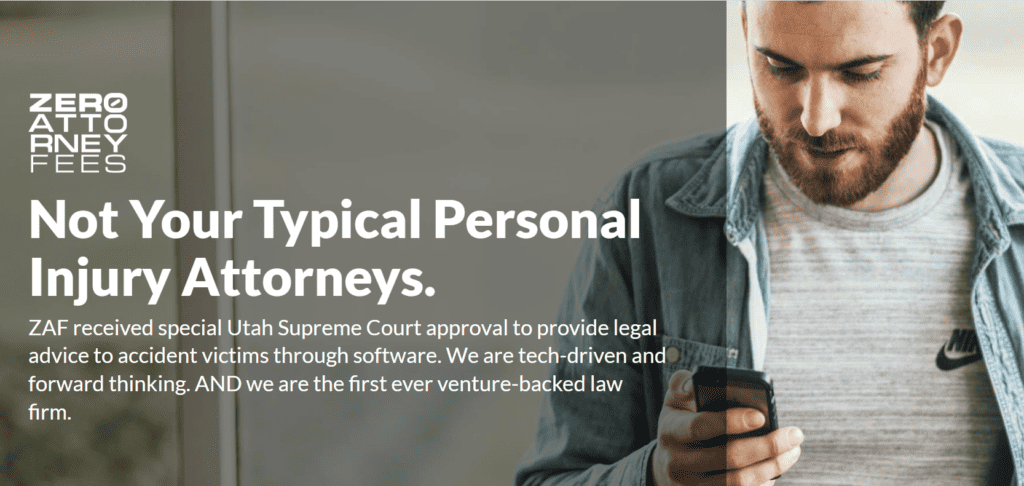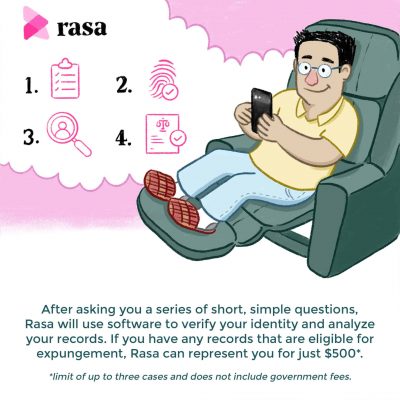LATEST UPDATES
Menu
Rule 5.4 operates as a wall, cutting lawyers off from modern forms of business and capital structuring and mechanisms to incentivize growth and innovation:
Further, even if new ideas emerge, we don’t allow lawyers to access the kind of capital necessary to invest in the research, development, design, and testing needed to take an idea from conception to implementation. We also don’t allow lawyers to offload some of the risk of that innovation process to investors.
Transformative innovations–in technology, business, or consumer service–require enormous investment and risk. That’s why we have developed mechanisms like public capital, venture capital, and private equity. It’s that kind of deep investment that has enabled some of the most significant innovations benefiting consumers today.
What Rule 5.4 really prevents is lawyers from leading this much needed consumer-focused transformation of legal services. It forces innovation to happen without lawyers inside leading, participating, and benefiting.
Two of the largest providers of consumer legal services are Legalzoom and Rocket Lawyer. Until each company elected to become regulated in Arizona and Utah respectively, they were entirely unregulated and lawyers could not directly participate.
Rule 5.4 reinforces the status of law as a highly insular echo chamber, limited to a group of people educated and trained in exactly the same way and interacting primarily with each other. The echo chamber makes it highly unlikely that new ideas will emerge to solve these intractable challenges around access, scale, and engagement with consumers.

In 2020, Utah and Arizona moved forward with significant reforms of legal regulation, including allowing and regulating nonlawyer investment and ownership. Though it is still early and the impacts are limited to two states, we can begin to see trends in emerging legal service providers. Legalzoom and Rocket Lawyer have each chosen to become regulated so that they can hire lawyers to supplement their technologically provided services.
In 2022, the Rhode Center published the first comprehensive report studying new providers in Utah and Arizona. We have also created a clearinghouse, providing the only regularly updated repository of entities authorized in both Utah and Arizona.


Nuttall, Brown & Coutts ➔ d/b/a “ZAF” Legal is among the oldest personal injury firms in Utah and might have been thought an unlikely entrant to Utah’s sandbox. In fact, the firm’s leadership was initially opposed to rule reforms out of concern that reforms would undermine their traditional model of providing bespoke, one-on-one legal services. After much discussion and debate, however, the firm unanimously voted to embrace the Utah reforms after examining data from the Insurance Research Council indicating that more than half of potential auto accident plaintiffs never get representation. In an effort to meet this latent demand, the firm has launched a new brand called ZAF (Zero Attorney Fees), built around a software tool, developed with investment from a venture capital firm, that is designed to serve personal injury plaintiffs. Once implemented, the platform will help accident victims navigate the complicated insurance claims process, gauge what is fair settlement value in their particular case, and get as much or as little lawyer help as they want. The firm envisions tiers of service going forward. The software-based, DIY tier of service will be completely free—hence the “zero” in the ZAF trade name. Higher tiers of service will be made available for a fee. In addition, the ZAF platform will support a subscription service entitling subscribers to legal representation for a monthly fee, with the full recovery going to the injured person rather than a contingency fee. Recognizing that this arrangement could present conflicts in certain cases—for instance, an accident involving an uninsured motorist or an accident with drivers from the same insurance company—the Utah sandbox conditioned approval on ZAF making clear disclosures at the point of sale. ZAF has also said it will refer cases presenting a conflict to another firm, covering any expenses. Tyler Brown, ZAF’s CEO, says: “I believe we can demonstrate that personal injury legal services need innovation and creativity at least as badly as other areas of law”.
Rasa Legal is a B-corporation using both AI-enabled software and nonlawyer providers to help Utahns determine whether they are eligible to expunge their criminal records and then execute the process. Consumers can use the software, which draws on data from both the state court system and the Utah Bureau of Criminal Identification, to make an initial determination of eligibility and then receive aid from nonlawyers in completing and filing required forms. These nonlawyer providers—who are subject to training and qualification and ongoing oversight by a Utah lawyer serving as Rasa’s legal director—are also authorized to provide legal advice to consumers and negotiate with prosecutors as needed. The cost of an expungement through Rasa is generally around $500—significantly cheaper than the $2000 to $3000 reportedly charged by a traditional lawyer. In order to develop the software and build out her company, Noella Sudbury, Rasa’s founder and CEO, raised external funding. She stated: “The Utah Sandbox has enabled me to build a company that can serve people when and how they need it. We—the tech, the staff, and the lawyers—help people clear their records for a low price and get back to building lives and careers and contributing to society.”

The ban on nonlawyer ownership is often justified as a non-waivable conflict-of-interest rule. The idea is that if lawyers are in business with nonlawyers, they will feel pressured to prioritize profits and violate ethics rules, including their fiduciary duty to clients.
But many legal ethics scholars and lawyers disagree with this premise, pointing out that the profit motive is already a central part of law practice. Indeed, the primary metric by which elite corporate law firms are measured, and by which many lawyers assess their job choices, is “profits-per-partner.”
